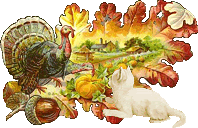
Well folks, it's getting close to Turkey Day!! While we pause this time of year and give thanks and stuff ourselves. We need to be very careful what we stuff our pets with. I'm familiar with a lot of pet food no no's. This year, I got an e-mail from the
ASPCA warning me of another. Raw bread dough. It makes perfect sense once you think about it, but I never even realized. I'm glad to know this. Read below for more information on the deadliness of raw bread dough:
THANKSGIVING SAFETY TIP: BREAD DOUGH'S A NO-NO FOR DOGS AND CATS
There'll be many cooks in the kitchen next Thursday—but don't spoil your pet by giving him bread dough. According to veterinarians at the ASPCA Animal Poison Control Center (APCC), when bread dough is ingested, an animal's body heat causes the dough to rise in the stomach. As alcohol is produced during the rising process, the dough expands. Pets who've eaten bread dough may experience abdominal pain, bloat, vomiting, disorientation and depression.
Take the case of the Labrador retriever who ingested several rolls that his pet parent had placed on the oven to rise. The owner didn't think much of this, and was more upset that the dog ate part of the holiday feast. But a few hours later, the owner noticed that the dog looked very lethargic. It wasn't long before the canine was reluctant to move and was retching.
As the symptoms intensified, the owner brought him to an emergency clinic, which contacted the APCC. Unfortunately, the dog's stomach was so severely distended that the only option at the time was to surgically remove the dough; he was also treated for alcohol toxicosis, caused by fermentation of the dough. The Labrador was kept at the clinic for the weekend and recovered completely.
Although this dog had ingested quite a bit of dough, an animal needs to eat only a small amount to cause a problem, because bread dough can rise to many times its size. Take care not to let Fluffy or Fido in the kitchen unsupervised when you're baking this holiday season—especially if you've got a professional chowhound who's always on the lookout for food.
In addition to offering poison prevention tips online, the APCC also runs an emergency hotline—(888) 426-4435—that provides round-the-clock telephone assistance.




























1 comment:
Wow. I remember that happening to a guy on Emergency back when I was a kid. I had no idea it was something that happened in real life.
Post a Comment